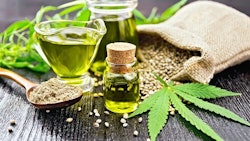Researchers from Cornell University have concluded that high levels of tetrahydrocannabinol (THC) are a result of genetics, not—as commonly thought—as a stress response to growing conditions.
The study of hemp’s likelihood to test “hot,” meaning it contains more than the legal limit of 0.3% THC, was recently published in the journal Global Change Biology-Bioenergy.
“[People thought] there was something about how the farmer grew the plant, something about the soil, the weather got too hot, his field was droughted, something went wrong with the growing conditions,” said Larry Smart, Ph.D., senior author and professor at the School of Integrative Plant Science at Cornell to the Cornell Chronicle. “But our evidence from this paper is that fields go hot because of genetics, not because of environmental conditions.”
Smart and his team studied the genetics and chemistry of 217 hemp plants at two sites in Ithaca and Geneva, New York. They found that differences in growing conditions between the sites had no significant influence on which chemicals the plants produced. However, they did find a correlation between the plant’s genetics and THC and cannabidiol (CBD) levels.
.png?auto=format%2Ccompress&fit=max&q=70&w=400) cornell hemp
cornell hemp
Jacob Toth, first author and second-year doctoral student in Smart’s lab, developed molecular markers to determine if their hemp plants fell into one of three genetic categories: plants with two THC-producing genes, plants with two CBD-producing genes or plants with one gene each for CBD and THC.
Researchers concluded that to minimize the risk of plants going hot, hemp growers should grow plants with two CBD-producing genes. To help breeders and cultivators, they have developed genetic markers that can be used on seedlings to determine genes for THC production and the sex of hemp plants prior to flowering.
























